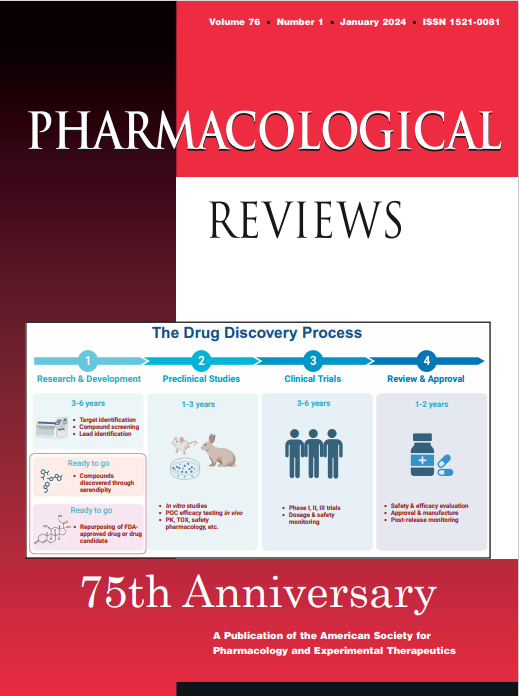Innovation in cancer pharmacotherapy through integrative consideration of germline and tumor genomes.
IF 17.3
1区 医学
Q1 PHARMACOLOGY & PHARMACY
引用次数: 0
Abstract
Precision cancer medicine is widely established, and numerous molecularly targeted drugs for various tumor entities are approved or in development. Personalized pharmacotherapy in oncology has so far been based primarily on tumor characteristics, e.g., somatic mutations. However, the response to drug treatment also depends on pharmacological processes summarized under the term ADME (absorption, distribution, metabolism, and excretion). Variations in ADME genes have been the subject of intensive research for more than five decades, considering individual patients' genetic makeup, referred to as pharmacogenomics (PGx). The combined impact of a patient's tumor and germline genome is only partially understood and often not adequately considered in cancer therapy. This may be attributed, in part, to the lack of methods for combined analysis of both data layers. Optimized personalized cancer therapies should, therefore, aim to integrate molecular information about the tumor and the germline, taking into account existing PGx guidelines for drug therapy. Moreover, such strategies should provide the opportunity to consider genetic variants of previously unknown functional significance. Bioinformatic analysis methods and corresponding algorithms for data interpretation need to be developed to consider PGx data in interdisciplinary molecular tumor boards, where cancer patients are discussed to provide evidence-based recommendations for clinical management based on individual tumor profiles. Significance Statement The era of personalized oncology has seen the emergence of drugs tailored to genetic variants associated with cancer biology. However, full potential of targeted therapy remains untapped due to the predominant focus on acquired tumor-specific alterations. Optimized cancer care must integrate tumor and patient genomes, guided by pharmacogenomic principles. An essential prerequisite for realizing truly personalized drug treatment of cancer patients is the development of bioinformatic tools for comprehensive analysis of all data layers generated in modern precision oncology programs.综合考虑种系基因组和肿瘤基因组,创新癌症药物疗法。
癌症精准医疗已广泛确立,许多针对不同肿瘤实体的分子靶向药物已获批准或正在开发中。迄今为止,肿瘤学中的个性化药物治疗主要基于肿瘤特征,如体细胞突变。然而,对药物治疗的反应还取决于药理学过程,即 ADME(吸收、分布、代谢和排泄)。五十多年来,ADME 基因的变异一直是深入研究的主题,考虑的是个体患者的基因构成,即药物基因组学(PGx)。人们对患者肿瘤基因组和种系基因组的综合影响仅有部分了解,在癌症治疗中往往没有充分考虑。部分原因可能是缺乏对这两个数据层进行综合分析的方法。因此,优化的个性化癌症疗法应以整合肿瘤和种系的分子信息为目标,同时考虑到现有的药物治疗 PGx 指南。此外,这种策略还应该提供机会,考虑以前未知功能意义的基因变异。需要开发生物信息学分析方法和相应的数据解读算法,以便在跨学科分子肿瘤委员会中考虑 PGx 数据,在该委员会中讨论癌症患者,根据个体肿瘤特征为临床管理提供循证建议。意义声明 个性化肿瘤学时代出现了针对与癌症生物学相关的基因变异而定制的药物。然而,由于主要关注获得性肿瘤特异性改变,靶向治疗的潜力仍未得到充分挖掘。优化癌症治疗必须在药物基因组学原则的指导下整合肿瘤和患者基因组。实现癌症患者真正个性化药物治疗的一个重要前提是开发生物信息学工具,以全面分析现代精准肿瘤学项目中生成的所有数据层。
本文章由计算机程序翻译,如有差异,请以英文原文为准。
求助全文
约1分钟内获得全文
求助全文
来源期刊

Pharmacological Reviews
医学-药学
CiteScore
34.70
自引率
0.50%
发文量
40
期刊介绍:
Pharmacological Reviews is a highly popular and well-received journal that has a long and rich history of success. It was first published in 1949 and is currently published bimonthly online by the American Society for Pharmacology and Experimental Therapeutics. The journal is indexed or abstracted by various databases, including Biological Abstracts, BIOSIS Previews Database, Biosciences Information Service, Current Contents/Life Sciences, EMBASE/Excerpta Medica, Index Medicus, Index to Scientific Reviews, Medical Documentation Service, Reference Update, Research Alerts, Science Citation Index, and SciSearch. Pharmacological Reviews offers comprehensive reviews of new pharmacological fields and is able to stay up-to-date with published content. Overall, it is highly regarded by scholars.
 求助内容:
求助内容: 应助结果提醒方式:
应助结果提醒方式:


